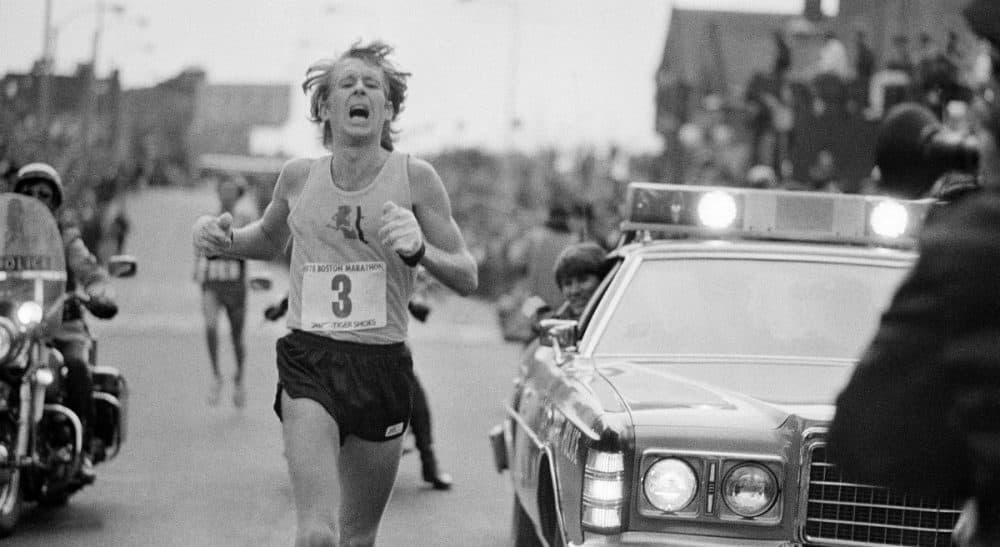Advertisement
Why 'Marathon' Is A Terrible Metaphor For Life

“It’s a marathon, not a sprint.” You’ve probably heard these immortal words (to the extent that “immortal” means “fatuous and overused”) applied to marriage, parenthood, career advancement, to living with chronic disease — hell, to life itself. So perhaps it’s not surprising that both Google and Goodreads attribute the origin of this phrase to the Pheidippides of daytime television, Dr. Phil. (Goodreads also slyly informs me that “None of your friends have liked this quote yet.” I have wonderful friends.)
Okay, I know I’m coming out of the gate — leaving Hopkinton, so to speak — sounding a little curmudgeonly. So let me stipulate at the outset: I have nothing but admiration for the people who commit to, train for and endure marathons. And that’s just the spectators I’m talking about. The runners — well, they’re marvelous.
marathons are of finite duration, and though lives and marriages are too, unless we’re talking about mosquitoes, even the most abbreviated life or miserable relationship lasts more than five hours.
But “marathon” is now marketing-speak for anything that’s just plain excessive. Call me crazy, but the act of watching a “How I Met Your Mother” marathon seems qualitatively different from schlepping 26.2 miles on foot, even while wearing really good ear buds. I’m guessing that the sense of accomplishment one derives from it isn’t exactly comparable either. More to the point, even when used properly — to describe a process that’s long and grueling, that requires pacing and discipline, that rewards those who keep their eye on the prize and don’t settle for the short-term reward — a detailed analysis suggests that “marathon” is a lousy metaphor for most of what it’s applied to.
For example, marathons are of finite duration, and though lives and marriages are too, unless we’re talking about mosquitoes, even the most abbreviated life or miserable relationship lasts more than five hours. Marathon runners are cheered during the race and lauded after it, but parenting is a less celebrated activity. As I recall, there were no throngs lining the oft-traversed hall from our daughters’ bedrooms to ours in the middle of the night, offering my husband and me high fives and Gatorade. Marathon runners receive data and feedback throughout the race, from the readings on their pedometers and heart rate monitors to the mileage markers along the route. But for parents, spouses, professional strivers and all of us just making it through the day, the race is unrecorded and our progress unmarked. We sprint and stumble, jog and lurch, traversing a course with no discrete end and only occasional insight into how we’re doing along the way.
And if a marathon really was an apt metaphor for life, what would a half-marathon be? A euphemism for sloth? Equivocation? Someone easily distracted?
Of course not. All silliness aside, this race is about goals — measurable, incremental and ultimately binary. You finish the race or you don’t. While completion time is important for the most elite runners, for the mass of people who may do this only a few times in their life, simply finishing matters far more than how long it took them to do it. Marathon runners tell me that what they most derive from the event (besides license to binge on carbs the night before) is a wonderful sense of their own capability. While many are moved by the camaraderie they develop along the way, running a marathon is ultimately a personal achievement. You do it, and then it’s done.
parenting, long-term relationships, living with illness -- these are shared journeys with no markers, only a handful of fans, and a very, very distant finish line.
But parenting, long-term relationships, living with illness — these are shared journeys with no markers, only a handful of fans, and a very, very distant finish line. You’re never done, but with a little luck and wisdom, you get stronger as you go.
So if we’re seeking metaphors, maybe we should look to the ancient Greek city for which the race is named. If Wikipedia is to be trusted (and heaven help me if it isn’t), “marathon” is the Greek word for fennel. And though my running prowess is exceeded only by my botanical expertise, I do cook. I know that fennel is a hardy perennial, tangy and strong, spicy and healing. Now that’s the metaphor I want for my life.
